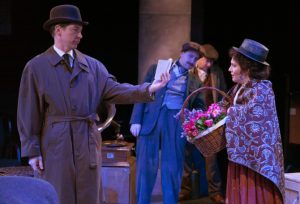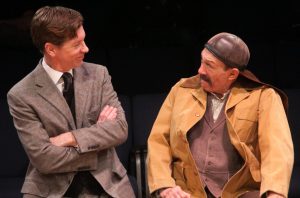GALATEA GETS HER PLAY
The source has finally come into its own: Overshadowed by the thunderous success of My Fair Lady, its musical spinoff, Pygmalion, George Bernard Shaw’s superbly penned, radiantly witty, and still-urgent drama from 1914, has long been overshadowed and undervalued. True to its mission to forge thinking theater from polished performers, Remy Bumppo Theatre Company gives the old play its due and more.
Shawn Douglass’s in-the-round staging–a first, I believe, for the upstairs stage at Greenhouse Theatre Center–necessarily forces props to stand in for sets (there are many expensive locales in the original) and condenses an expansive work into two and a half hours. Pared down to its astute arguments, the relevant essence and probing paradoxes of G.B.S.’s provocation seem newly fleshed out and fresher than ever. However wonderful Lerner and Loewe’s score, it’s not, it seems, indispensable to the success of Shaw’s script.
Pygmalion is, as the title suggests, a puzzle or problem play about a teacher transformed by his student (as a sculptor once fell in love with his statue). Unlike My Fair Lady, there’s no happy (as in romantic) ending: These protagonists are too different for anything as regular as marriage. What bonds Nick Sandys’s superbly supple Henry Higgins to Kelsey Brennan’s feisty and finally formidable Eliza Doolittle is a dance of differences created by a certain “inspired folly” or linguistic experiment. Making a bet with another confirmed old bachelor (Peter A. Davis’s avuncular Colonel Pickering), this teacher of phonetics (who can recognize 130 vowel sounds) will transform a Covent Garden flower girl into a pretend patrician at an embassy garden party. The “squashed cabbage leaf” will be passed off as an upper-class orchid.
Much less time is spent here on Eliza’s education in elocution–and a lot (more than the musical offers) on the ugly aftermath. Shaw’s true interest is not in carrying out Higgins’s intellectual caprice but on Eliza’s fate after she confirms Higgins’ theory that arbitrariness of accent more than actual merit has more to do with social success. Now that this Cockney “guttersnipe” has been trained to be a toff, smoothly silly with a social butterfly’s small talk, she’s no good for selling flowers or anything but herself. Does Higgins owe his creation anything more than ingratitude?
 Shaw’s showdown between pupil and professor drives home his still-topical dissent. Suddenly won over to etiquette and politeness, Eliza believes it’s not how you behave but how you’re treated that determines rank and worth. No friend of hypocrisy or cant, Higgins maintains that the best manners are the same manners for everyone’”in his case, treating the entire world with equal rudeness. She wants kindness from Higgins as she got from Pickering. He won’t give her what she won’t earn. Their impasse is unbridgeable.
Shaw’s showdown between pupil and professor drives home his still-topical dissent. Suddenly won over to etiquette and politeness, Eliza believes it’s not how you behave but how you’re treated that determines rank and worth. No friend of hypocrisy or cant, Higgins maintains that the best manners are the same manners for everyone’”in his case, treating the entire world with equal rudeness. She wants kindness from Higgins as she got from Pickering. He won’t give her what she won’t earn. Their impasse is unbridgeable.
Their standoff, however, triggers electric drama. Rich with its subversion of class distinctions and gender stereotypes, the Shavian byplay sparkles, crackles and matters: Sandys and Brennan carry off their galvanic exchanges like determined detonators. Douglass inspires another persuasive triumph from David Darlow as Eliza’s dad Alfred: Proclaiming himself a deservedly poor dustman, Alfred loses his lust for life when unsought success ruins him with respectability. Hog-tied by middle class morality, he’s forced to marry his common-law wife and make them both miserable. He was better off with a pint and no future.
Equally wonderful is Annabel Armour’s imperious Mrs. Higgins, Henry’s sensible and proto-feminist mother: She has a much larger role in the play, not just as a go-between but as the rational exponent of a middle ground between the next generation’s intractable absolutes. (Less successful is Douglass’s framing device: A now-mature Eliza returns, sometime in the 1940s judging by the jitterbug and country-western backdrop, to Higgins’s former Wimpole Street digs. It’s just an excuse to change the settings.)
Aficionados of My Fair Lady will be fascinated by how and where that masterpiece transposed scenes, its goal to depict an emotional dependency between Henry and Eliza that finally goes both ways. But, of course, coming forty years first, Pygmalion stands by itself. It’s well worth this restoration: Eliza’s declaration of independence resonates across the years, a thing of beauty and a joy forever. Higgins’s cunning, if unwitting, collaboration in her freedom is just what Pygmalion owed Galatea: She gets to breathe on her own, whether as “my fair lady” or her own emancipated woman.
photos by Johnny Knight
Pygmalion
Remy Bumppo
Greenhouse Theater Center, 2257 N. Lincoln Ave.
Thurs – Sat at 7:30; Sun at 2:30
plus select Wednesdays and matinees
ends on January 8, 2017
for tickets, call 773.404.7336 or visit Remy Bumppo
for more shows, visit Theatre in Chicago



